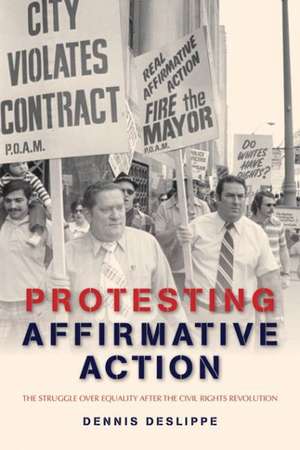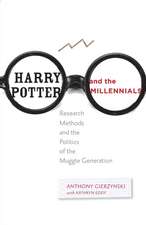Protesting Affirmative Action – The Struggle Over Equality After the Civil Rights Revolution: Reconfiguring American Political History
Autor Dennis Deslippeen Limba Engleză Paperback – 14 apr 2014
Preț: 262.67 lei
Nou
Puncte Express: 394
Preț estimativ în valută:
50.26€ • 52.62$ • 41.59£
50.26€ • 52.62$ • 41.59£
Carte tipărită la comandă
Livrare economică 05-19 aprilie
Preluare comenzi: 021 569.72.76
Specificații
ISBN-13: 9781421413709
ISBN-10: 1421413701
Pagini: 296
Dimensiuni: 154 x 228 x 20 mm
Greutate: 0.41 kg
Editura: Johns Hopkins University Press
Seria Reconfiguring American Political History
ISBN-10: 1421413701
Pagini: 296
Dimensiuni: 154 x 228 x 20 mm
Greutate: 0.41 kg
Editura: Johns Hopkins University Press
Seria Reconfiguring American Political History
Textul de pe ultima copertă
A lightning rod for liberal and conservative opposition alike, affirmative action has proved one of the more divisive issues in the United States over the past five decades. Dennis Deslippe offers a thoughtful study of early opposition to the nation's race- and gender-sensitive hiring and promotion programs in the workplace, including higher education.
Deslippe traces the conflict through compelling case studies of real people and real jobs. He asks what the introduction of affirmative action meant to the careers and livelihoods of Seattle steelworkers, New York asbestos handlers, St. Louis firemen, Detroit policemen, City University of New York academics, and admissions counselors at the University of Washington Law School. Through their experiences, Deslippe examines the diverse reactions to affirmative action, concluding that workers had legitimate grievances against its hiring and promotion practices. "A welcome examination of affirmative action opposition in the often-overlooked period before Bakke."--Choice
"It is difficult to think of a more timely historical topic: persistent ambivalence about affirmative action again collides with an economic downturn as an increasingly conservative Supreme Court considers landmark cases that may resolve some legal questions but are unlikely to end the almost half-century-old moral and political debate."--Journal of American Studies
"Deslippe's treatment of labor's resistance in particular is balanced, detailed, and nuanced, and he includes an excellent chapter on the precursor of Bakke, DeFunis v. Odegaard (1974)... A valuable discussion that clearly adds to the scholarship on this crucial subject."--Journal of American History
"Ambitious and timely."--Labor Studies Journal
"Treats the very important subject of affirmative action in a way that respects the various participants in the debate and in a manner that illuminates a critical part of recent American history."--Edward D. Berkowitz, George Washington University
Deslippe traces the conflict through compelling case studies of real people and real jobs. He asks what the introduction of affirmative action meant to the careers and livelihoods of Seattle steelworkers, New York asbestos handlers, St. Louis firemen, Detroit policemen, City University of New York academics, and admissions counselors at the University of Washington Law School. Through their experiences, Deslippe examines the diverse reactions to affirmative action, concluding that workers had legitimate grievances against its hiring and promotion practices. "A welcome examination of affirmative action opposition in the often-overlooked period before Bakke."--Choice
"It is difficult to think of a more timely historical topic: persistent ambivalence about affirmative action again collides with an economic downturn as an increasingly conservative Supreme Court considers landmark cases that may resolve some legal questions but are unlikely to end the almost half-century-old moral and political debate."--Journal of American Studies
"Deslippe's treatment of labor's resistance in particular is balanced, detailed, and nuanced, and he includes an excellent chapter on the precursor of Bakke, DeFunis v. Odegaard (1974)... A valuable discussion that clearly adds to the scholarship on this crucial subject."--Journal of American History
"Ambitious and timely."--Labor Studies Journal
"Treats the very important subject of affirmative action in a way that respects the various participants in the debate and in a manner that illuminates a critical part of recent American history."--Edward D. Berkowitz, George Washington University
Notă biografică
Descriere
In studying this phenomenon, Deslippe deepens our understanding of American democracy and neoconservatism in the late twentieth century and shows how the liberals' often contradictory positions of the 1960s and 1970s reflect the conflicted views about affirmative action many Americans still hold today.















